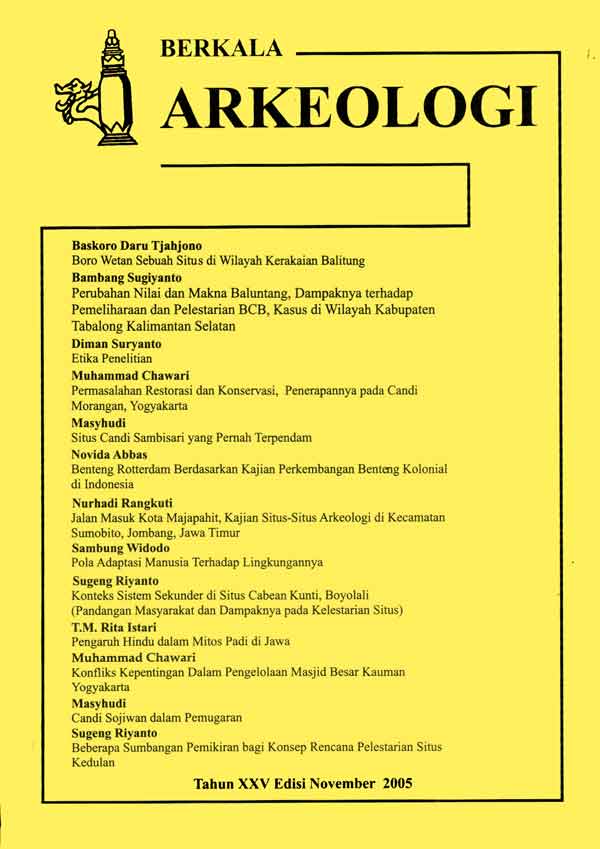CANDI SOJIWAN DALAM PEMUGARAN
Main Article Content
Abstract
The restoration of Sojiwan Temple is still in the early stages of implementation, namely up to the stage of installing the foundation or the foot of the temple. In several other parts, including the installation of the veranda floor, the installation of the body and roof of the temple, and the installation of the temple stairs have not been carried out. Nevertheless, the restoration of Sojiwan Temple will take place in accordance with the activity plan, as has been prepared during the restoration preparation stage (pre-restoration). Because the restoration implementation activities will continue, it is necessary to have a partnership with several related agencies or institutions, especially in terms of human resource needs who have expertise in certain fields, so that the smooth implementation of the restoration will show results in accordance with the expectations of all parties
Article Details

This work is licensed under a Creative Commons Attribution-NonCommercial-ShareAlike 4.0 International License.
References
Acharya, Prasanna Kumar. 1993. Architecture of Manasara. Oxford University Press, London.
Anonim. 2003. Laporao Bulanao Pemugaran Candi Sojiwan. Proyek Pemanfaatan Peninggalan Sejarah.
Blom, J.R. Van. 1935. Tjandi Sadjiwan. H.R. Stenfert Kroese's Uitg. Mij, Leiden.
Boechari. 1978. Bahan Kajian Arkeologi untuk Pengajaran Sejarah. Majalah Arkeologi Th. II, No. 1.
Kempers, A.J. Bernet. 1959. Ancient Indonesian Art. Harvard University Press, Amsterdam.
Kramrisch, Stella. 1946. The Hindu Temple. University of Calcutta, Calcutta.
Mundardjito. 1993. Pertimbangan Ekologi dalam Penempatan Situs Masa Hindu-Buda di Daerah Yogyakarta: Kajian Arkeologi Ruang Skala Makro. Disertasi. Universitas Indonesia, Jakarta.
Soekmono. 1977. Candi Fingsi dan Pengertiannya. IKIP Semarang Press, Semarang.
Soekmono. 1993. Ratu Boko Quo Vadis. Dalam Pertemuan Teknis dalam Rangka Evaluasi Program Pemugaran Situs Ratu Boko, Yogyakarta.
Stutterheim, W.F. 1937. He Zinrijke Waterwerk van Djalatoenda, TBG LXVII: 173-216.

